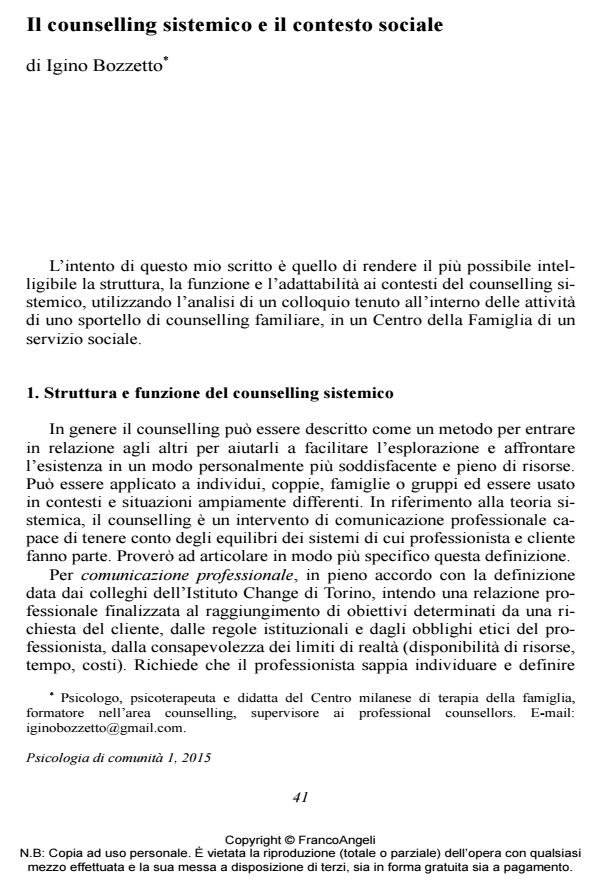The systemic counseling and social context
Journal title PSICOLOGIA DI COMUNITA’
Author/s Igino Bozzeto
Publishing Year 2015 Issue 2015/1 Language Italian
Pages 9 P. 41-49 File size 51 KB
DOI 10.3280/PSC2015-001005
DOI is like a bar code for intellectual property: to have more infomation
click here
Below, you can see the article first page
If you want to buy this article in PDF format, you can do it, following the instructions to buy download credits

FrancoAngeli is member of Publishers International Linking Association, Inc (PILA), a not-for-profit association which run the CrossRef service enabling links to and from online scholarly content.
After a general definition of the structure and function of the sistemi-relational counseling, with special attention to the interpretation given by the Milan Approach, the Author describes an applicated experience in the context of the Social Services: the help desk of family counseling at the Centro per le Famiglie.
Keywords: Systemic counseling, professional communication, hypothesizing, circularity and neutrality, contexts, social services
- Bert G. (2006). Ma perché non fa quello che le ho detto? Torino: Change.
- Bert G., Quadrino S. (2005). L’arte di comunicare. Torino: Change.
- Bozzetto I., Apolloni T., Fischbein M. (2010). Sawubona. Conversazione postuma con Gianfranco Cecchin. Padova: Unipress.
- Cirillo S. (1990). Il cambiamento nei contesti non terapeutici. Milano: Raffaello Cortina.
- Edelstein C. (2007). Il counselling sistemico pluralista. Trento: Erickson.
- Formenti L., Caruso A., Gini D. (2008). Il diciottesimo cammello. Milano: Raffaello Cortina.
- Fruggeri L. (1997). Famiglie. Roma: La Nuova Italia Scientifica.
- Milner J., O’Byrne P. (2004). Il counselling narrativo. Trento: Erickson.
- Piroli S. (2006). Counselling sistemico. Parma: UNI.NOVA.
- Sclavi M. (2000). Arte di ascoltare e mondi possibili. Milano: Le Vespe.
- Selvini M., Boscolo L., Cecchin G., Prata G. (1980). Hypothesizing, circularity, neutrality. Family Process, 19: 73-85 (trad. it. Ipotizzazione, circolarità, neutralità: tre direttive per la conduzione della seduta. In: Selvini M. (1985). Cronaca di una ricerca. L’evoluzione della terapia familiare nelle opere di Mara Selvini
- Palazzoli. Roma: La Nuova Italia Scientifica).
- Tomm K. (1987a). Interventive interviewing, pt. I: Strategizing as a forth guideline for the therapist. Family Process, 26: 3-13 (trad. it. Lo Strategizing come quarta linea-guida per il terapista. Il Bollettino, 22: 37-48, 1991).
- Tomm K. (1987b). Interventive interviewing, pt. II: Reflexive questioning as a mean to enable self-healing. Familiy Process, 26: 167-183 (trad. it. Le domande riflessive come mezzi per condurre all’autoguarigione. II Bollettino, 23: 3- 19, 1991).
- Tomm K. (1988). Interventive interviewing, pt. III: Intending to ask lineal, circular, strategic or reflexive questions. Family Process, 27: 1-15 (trad. it. Intendi porre domande lineari, circolari, strategiche o riflessive? Il Bollettino, 24: 1-14, 1991).
- Watzlawick, P., Beavin J. H., Jackson D. D. (1967). Pragmatics of Human Communication. A Study of Interactional Patterns, Pathologies, and Paradoxes. New York: W.W. Norton & Co. Inc. (trad. it.: Pragmatica della comunicazione umana. Roma: Astrolabio, 1971).
Igino Bozzeto, Il counselling sistemico e il contesto sociale in "PSICOLOGIA DI COMUNITA’" 1/2015, pp 41-49, DOI: 10.3280/PSC2015-001005